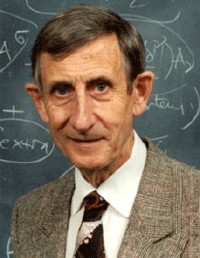Silicon-based life and dust-based life are fiction and not fact. I use them as examples to illustrate an abstract argument. The examples are taken from science-fiction but the abstract argument is rigorous science. The abstract concepts are valid, whether or not the examples are real. The concepts are digital-life and analog-life. The concepts are based on a broad definition of life. For the purposes of this discussion, life is defined as a material system that can acquire, store, process, and use information to organize its activities. In this broad view, the essence of life is information, but information is not synonymous with life. To be alive, a system must not only hold information but process and use it. It is the active use of information, and not the passive storage, that constitutes life.
Is Life Analog or Digital?
Question for Edge discussion group from Freeman Dyson

FREEMAN DYSON is professor of physics at the Institute for Advanced Study, in Princeton. His professional interests are in mathematics and astronomy. Among his many books are Disturbing The Universe, Infinite In All Directions Origins Of Life, From Eros To Gaia, Imagined Worlds, and The Sun, The Genome, And The Internet.
Click here for Freeman Dyson's Edge Bio page.
THE REALITY CLUB George Dyson, Cliff Pickover, Joseph Traub, Jaron Lanier, Stewart Brand, William H. Calvin, Marvin Minsky, Charles Simonyi, Stewart Brand, Kevin Kelly, Lee Smolin, Philip W. Anderson, Marc D. Hauser, Jordan B. Pollack, Nicholas Humphrey, Steve Grand, W. Daniel Hillis, Marvin Minsky, John McCarthy, Jaron Lanier, John Baez, Terry Sejnowski
Response to the responders from Freeman Dyson





